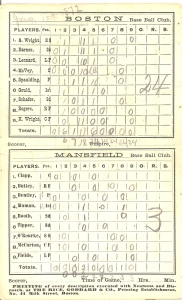1923
Bill Eliminating Hubbard From One of Posts Passed
Middletown Democrat Must Quit Trusteeships or Board of Finance.
Opposition Baffled.
Trumbull Amendment Confuses Legislators, and Wadhams is Saved.
(By Telegram Staff Correspondent)
Hartford, March 13.–The Republican state organization baffled all potential opposition in the Senate today, on the “ripper” bill framed to remove E. Kent Hubbard, Middletown Democrat, from either the State Board of Finance or from his positions as trustee of the Connecticut Agricultural college and as director of the State Reformatory at Cheshire. An amendment to the bill as originally passed by the House, was offered by Senator John H. Trumbull, and was interpreted by those who had been planning to oppose the measure as removing the discrimination contained in the original language of the bill, saving John M. Wadhams, chairman of the board, but eliminating Hubbard.
Senators Confused.
Under this interpretation, the bill was passed by the Senate with Senator John N. Brooks, and Senator Ralph L. French as the only dissenters. It was only after the bill had been passed, that senators discovered the wording of the amendment did not affect Wadhams, but only eliminated Hubbard. When the bill reached the House, for concurrent action as amended, House Leader Buckley said: “This amendment wipes out the exceptions in the bill,” and said that the Judiciary committee had no objection to its passage. The amendment and the bill were passed without a dissenting voice even on the part of the Democrats.
Had Row With Clark.
The passage of the bill, under the terms of which Mr. Hubbard must either decline reappointment to the State Board of Finance, or withdraw from his trusteeship in the Connecticut Agricultural college and his directorship in the Cheshire reformatory, was accompanied by a report in capitol corridors that the move against Hubbard had its inception originally in a row between Charles Hopkins Clark, editor of the Hartford Courant, an “elder statesman” of the Republican state machine, and Mr. Hubbard. Both are directors of the Cheshire reformatory, and it is said that the disagreement arose over the superintendency of the institution, on which the two disagreed violently.
The bill passed is as follows:
‘No person shall hold office as an appointive member of the State Board of Finance while such person is an appointee by the Governor as a trustee, director, commissioner or member of the board of managers of any state institution or any institution receiving aid from the State by specific appropriation by the General Assembly.”
From the Bridgeport Telegram (Bridgeport, Conn.), March 14, 1923.
1976
Middletown High Wins State Championship!
Led by Cornelius “Corny” Thompson, the Middletown High School basketball team won the Class M State Championship, defeating Ellington High School by a score of 63 to 38. The team, coached by Thomas LaBella, himself a member of the 1964 championship team, went on to win the 1977 and 1978 state championships. Thompson went to the University of Connecticut and led the team in scoring for all 4 of his years there (1978-1982) with 1,810 points and 1,017 rebounds. He was drafted into the NBA and played for the Dallas Mavericks and for top teams in Italy and Spain.
Story contributed by Deborah Shapiro.




